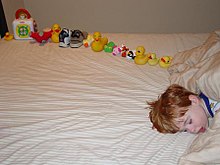 An exhaustive study of autism in one community has found that the disorder is far more common than suggested by earlier research. The study of 55,000 children in Goyang, South Korea, found that 2.64 percent — one in every 38 children — had an autism spectrum disorder.
An exhaustive study of autism in one community has found that the disorder is far more common than suggested by earlier research. The study of 55,000 children in Goyang, South Korea, found that 2.64 percent — one in every 38 children — had an autism spectrum disorder.
"That is two and a half times what the estimated prevalence is in the United States," says Roy Richard Grinker, a professor of anthropology at The George Washington University and one of the study's authors.
The South Korean study probably produced such a high figure because it screened a lot of kids who seemed to be doing OK and included in-person evaluations of any child suspected of having autism, Grinker says.
"Two-thirds of the children with autism that we ended up identifying were in mainstream schools, unrecognized, untreated," he says.
The team of Korean and American scientists who carried out the study, published online in the American Journal of Psychiatry, say the result doesn't mean there's something different about South Korean children.
"There's no reason to think that South Korea has more children with autism than anyplace else in the world," says Bennett Leventhal, another author of the study. Leventhal is also deputy director of New York's Nathan Klein Institute for Psychiatric Research and a professor of child and adolescent psychiatry at New York University Medical Center.





 Toothpaste can be widely contaminated with lead and other dangerous heavy metals, new research shows.
Most of...
Toothpaste can be widely contaminated with lead and other dangerous heavy metals, new research shows.
Most of... CT scans diagnose afflictions from tumors to kidney stones to life-threatening diseases and injuries, such as...
CT scans diagnose afflictions from tumors to kidney stones to life-threatening diseases and injuries, such as...






























